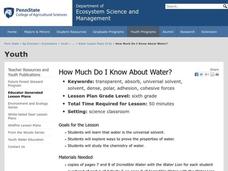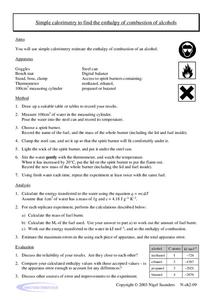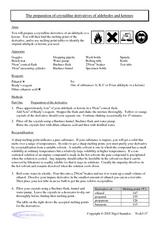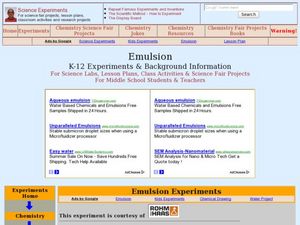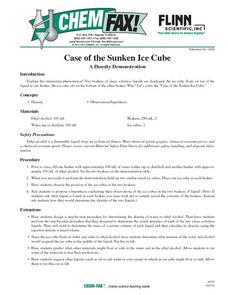Curated OER
Making "Cents" of Surface Tension
Students explore the unique behaviors of water. They investigate surface tension using water drops on a penny and pennies dropped in a cup.
Curated OER
Activity #4 Ground Water Model In a Jar
Students devlop a model, which they illustrate a water table and allow for the discussion of common terms and illustrate what those terms mean. They comprehend that a flow rates, removal of contaminants, and the amount of water stored...
Curated OER
How Much Do I Know About Water?
Sixth graders explore ways to analyze the properties of water and examine the chemistry of water. In this water instructional activity students work in groups and complete several activities.
Curated OER
Chemistry: The Collapsing Can
Students observe methods by which air can crush aluminum cans. As water in the can boils and is sealed, the can collapses as it cools. When the procedure is reversed, the can expands to its original shape. After the alternate experiment,...
Curated OER
Reactivities of the Group 7 Elements (The Halogens)
During this lab activity, chemists discover the reactivities of chlorine, bromine, and iodine as examples of the halogens. They use a displacement reaction as a test by adding other compounds and observing for a color change. The lab...
Curated OER
Comparing the Degree of Unsaturation of Margarine with that of Butter
Is butter better? In terms of saturation, young chemists find out! Using titration methods, they will compare the degree of unsaturation of butter with that of margarine. Knowing the unsaturation, they can make conclusions about the...
Curated OER
A Solubility Curve for Potassium Nitrate
Step-by-step laboratory instructions are listed so that chemistry explorers can consider the solubility of potassium nitrate. They combine their results with those of other lab groups and then graph the data to display the solubility...
Curated OER
Properties of Ionic and Covalent Compounds
Test six various reagents for their ability to conduct electricity. Cooperating chemists research whether each is ionic or covalent and discover the relationship between bonding and conductivity. This laboratory exercise would be an...
Curated OER
Simple Calorimetry to Find the Enthalpy of Combustion of Alcohols
Accomplished chemistry learners set up a calorimeter and measure the energy released by various alcohols: methanol, ethanol, and either propanol or butanol. Lab masters will first need to design their own tables for recording data....
Curated OER
Preparation of Crystalline Derivatives of Aldehydes and Ketones
Chemistry explorers prepare a crystalline derivative and find its melting point. Once they discover the melting point, they are able to identify whether or not the substance is pure, and whether it is an aldehyde or ketone. This is an...
Mascil Project
Molecular Gastronomy - Science in the Kitchen
Some say cooking is an art—and a science! Scholars scope out the savory subject of molecular gastronomy with a series of related activities. The teacher's guide contains printable worksheets and helpful tips for implementing the...
Curated OER
Find the Percent of Iron in Manganate (VII)
Dilute sulphuric acid is used to oxidize manganate (VII) into manganese (II) and water. Step-by-step procedures are outlined on the worksheet as well as calculations for junior chemists to perform in their science journals. This...
American Chemical Society
Changing State: Freezing
There are five types of frost: ground frost, air frost, hoar frost, glaze, and rime. Scholars mix ice and salt in a metal container to observe frost forming on the outside of the can. Animations and videos enhance the learning.
Curated OER
Electrolysis
Students conduct a series of experiments on water electrolysis. In this chemistry instructional activity, students explain what happens to the molecules during the process. They cite real world applications of electrolysis.
Curated OER
Disposable Diaper Comparison and Mystery Powder Identification
Students investigate which diaper is the most absorbent. In this chemistry lesson, students calculate how much water is absorbed by diapers. They identify an unknown powder based on physical and chemical properties.
Curated OER
Emulsions
Students identify the characteristics and composition of emulsions. In this chemistry lesson, students classify household products according to emulsion type. They explain how to make the best emulsion.
Curated OER
Rusting-A Form of Oxidation
Young scholars conduct an experiment to observe oxidation. In this chemistry lesson, students explain how rusting happens. They rank metals according to their conductivity.
Curated OER
Solution Shapes
In this solutions worksheet, students soak a pipe cleaner in hot water and a supersaturated solution of 20 Mule Team Borax. Kids leave their pipe cleaner in the solution for 30 minutes and then observe. They put it back in over night and...
Curated OER
The Nature of Chemical Change: Acting Out an Example
Students identify the signs that a chemical reaction took place. In this chemistry lesson, students role play the movement of different molecules of matter. They classify matter according to their properties.
Curated OER
How much Carbon Dioxide is in My Seltzer Water?
Students discover the law of conservation of mass though experimentation. In this chemistry lesson, students experiment with acid - base indicators to determine the presence of carbon dioxide. Students complete the labs with analysis...
Curated OER
Chemistry: The Case of the Sunken Ice Cube
Young scholars examine a density demonstration involving ice cubes and beakers of water and alcohol. After observing how one ice cube floats in water and sinks in alcohol, they determine which mixture of the two would suspend the ice...
Curated OER
Chemistry First Marking Period Review
In this chemistry review worksheet, students review terms and concepts covered. Students practice metric conversions, factor labeling, temperature conversions, heat calculations, atomic structure, and gas laws. This worksheet has 3...
Curated OER
Hard Water
For this water worksheet, students read how hard water is created and what can be done to soften the water. Then students complete 6 short answer questions.
Curated OER
Reactions of Group 1 Metals With Water
In this elements worksheet, learners complete a graphic organizer comparing observations of lithium, sodium, and potassium. Then students determine how these elements react with water. Learners complete 3 fill in the blank questions.
Other popular searches
- Water Chemistry
- Lake Water Chemistry
- Water Chemistry Ions
- Co2 Water Chemistry
- Water Chemistry Lesson Plans
- Ocean Water Chemistry
- Basic Water Chemistry
- Water Chemistry Properties
- Storm Water Chemistry
- Marine Water Chemistry
- Size vs. Water Chemistry
- Water Chemistry Nitrate




